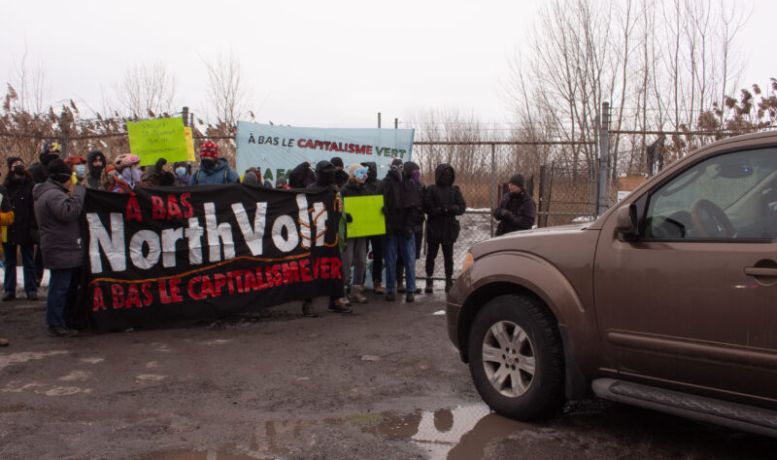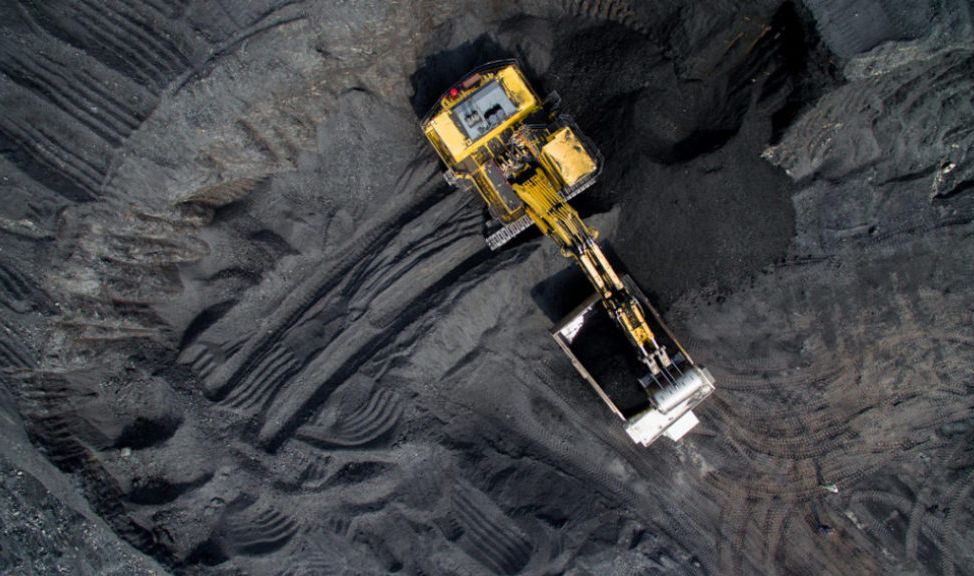Carlo Mosti is a member of Alternative Socialiste, ISA in Québec
Québec’s Minister of Economy, Fitzgibbon, has been defensive about the construction of the multi-billion-dollar Northvolt battery plant south of Montreal. The most recent criticism is that the mega-plant project is being rushed through, even dodging a proper environmental assessment. The right-wing CAQ government changed the rules so that Northvolt does not even have to be reviewed by the toothless Office of Public Hearings on the Environment (Bureau d’audience publique en environnement, BAPE).
Premier Legault made a personal joke, scorning critics of the government’s decision – with apple, orange and banana in hand.
The government is determined to push ahead with the project. Between the governments of Québec and Canada, Northvolt has received $7 billion in financial support. Québec Hydro plans to spend $185 billion by 2035 to provide more power, increase the share of renewables and improve reliability — all part of a drive to encourage investment. Québec is not alone in a hoped-for boom in electric vehicles. VW and Stellantis have received at least $28.5 billion to each build a new factory in Ontario making lithium-ion batteries. However, there are questions about how long this technology will be used. Canada is pushing ahead with new mining projects.
To hell with the environment, profit comes first
The first Northvolt hurdle: announcing the implementation of the project before a prior impact study and a period of public information and consultation. Naturally, this does not bode well for the so-called “social acceptance” on which reformist parties and organizations will try to gain some popular support. A 2023 analysis of the site by a government biologist determined that there was a great deal of biodiversity in the wetlands that would be destroyed if the construction of a housing project went ahead. That analysis took almost 3 years to complete. But with Northvolt, science suddenly disappeared. The same biologist produced a completely opposite report in 2024 to give the go-ahead to the Northvolt project, which covered an area three times larger than the planned housing and capable of causing twice the damage. And this time, it took only 4 months to render its decision. Meanwhile, the owner of the land for the proposed housing project is laughing his head off, having bought the land for $20 million and sold it to Northvolt for $240 million. People shouldn’t be surprised to see the government dismiss the relevance of the BAPE under the circumstances. In any case, what real power does BAPE, a creation of the capitalist system, have other than to determine whether the project is dark green, light green or brown? The Québec government even made sure to change the rules, so the Northvolt project does not need any BAPE verification.
That the company plans to plant trees afterwards to reduce its impact may seem mathematically correct. But will it also effectively reproduce the wetlands that have disappeared? Will the biodiversity and species found in this area suddenly be found in the new landscaped areas? Planting trees to replace wetlands is like adding another lung to replace the two kidneys you’ve just had ripped out: it won’t prolong life. Here, I think it would be appropriate in this case to take out an orange, an apple and a banana to draw us a picture.
Battery production itself is likely to generate pollution. On the one hand, it could be argued that batteries are more than 90 percent recyclable and could approach 100 percent in the future. If the battery can’t provide a second life because it’s too damaged, most of the raw materials used in battery manufacture can be extracted, separated and reused for further purposes. But there is still a certain amount of residual material that ends up in the usual landfill sites. On the other hand, the extraction of lithium, an important component of the battery, is highly polluting. So, while battery manufacturing and recycling may not pollute as much, the extraction of raw materials will remain a major environmental issue.
The electric car industry is still in its infancy. Not all countries have an energy model like Québec’s, based mainly on hydroelectricity and wind power. If a country has to rely on electricity generated from coal or oil, then moving to electric vehicles only shifts where the fossil fuels are used. This still allows the fossil fuel industry to continue making profits at the expense of the environment but allows an individual driver the impression they made the right ecological choice for the future. Welcome to the hypocrisy of green capitalism!
Being in a capitalist world, the lure of profit will not simply disappear with the gasoline-powered car. There will always be more cars on the road, more materials extracted and processed, and more end-of-life management for batteries, whose production will continue to explode. Will the industry have developed the infrastructure fast enough to meet the growing demand for battery recycling? Or will the dead batteries be piled up like other piles of recyclables that don’t generate enough profit to take care of them?
The car market promotes the use of a form of transport that is ultimately individual, and which dominates the world’s roads and highways. All media — radio, TV, newspapers and the Internet — are full of advertising promoting the purchase of a new car. It’s mind-boggling how abusive it is; literally bombarding people all day long. The ecological alternative par excellence — public transit, a public service — is killed and made invisible. The ads promote individual freedom and the comfort of being in control of the route. In the ads the cars are always alone in a totally deserted landscape, whether in the city or in the wilderness. But the reality for working people is quite different: making the same car-clogged commute to work, day after day. What kind of freedom is this? The freedom to be stuck in traffic for hours on end, losing time and a good quality of life for the privilege of being in a lush car? The freedom to parade around in a beautiful model that is only accessible to a small clique of people, or to workers who, for the privilege of strutting their stuff, are going to be up to their ears in debt to their bank for years to come?
For those who think that Northvolt is the apostle of green capitalism, that they won’t bend the most elementary rules, even those laid down by bourgeois laws, think again! Far away in Sweden, where factories have already been set up, it is clear that Northvolt doesn’t give a damn about environmental rules. In February, a complaint was lodged with the Swedish police for “unauthorized environmental activities” against their Västeras lab in Västmanland county. Northvolt has admitted to having discharged a certain quantity of lithium into wastewater in excess of the agreement reached with the authorities. This battery multinational is neither as white as snow, nor as green as it claims.
Broadening an analysis of environmental impacts would include the companies that supply the raw materials needed to build the batteries. This includes mining companies such as Nouveau Monde Graphite, which operates an open-pit graphite mine in the town of St-Michel-des-Saints. This is another project that Québec has given the go-ahead for, because it’s supposed to generate major economic spin-offs and therefore doesn’t need to be criticized by environmentalists. And always the same praise from political leaders: more jobs, more people coming to live in the city, more revenue for the municipality. However, the method of burying the mine tailings generated by graphite extraction was not fully tested by BAPE, but the government gave its blessing anyway. So, once again, BAPE is being sidelined so as not to slow down the “economic advances” desired by the CAQ government. It’s a recurrent way of pushing through projects that pay off. But for whom, exactly?
Jobs and economic spinoffs: the perfect smokescreen
Northvolt’s promise of 3,000 well-paid jobs is the stuff of dreams. And yet, ever since the COVID pandemic in 2019, we’ve been hearing in the media that, whatever the field, companies are struggling to find employees to fill their positions; they keep on saying that there is a labour shortage everywhere. In reality, it’s more of a wage shortage. With $7 billion, the government could have provided much better working conditions for healthcare workers, improved the retention rate, attracted new workers to the field and ensured that the healthcare system was truly fully staffed and able to provide better services. Are the claimed 3,000 jobs all well paid? At the Skellefteå plant in northern Sweden, the shortage of employees would explain the delay in production that has already cost the company several hundred million dollars. The proposed plant in Montérégie will have a production capacity four times that of Skellefteå.
In the case of the open-pit mine at St-Michel-des-Saints, the Atikamekw people who live on the territory exploited by the graphite mine have yet to agree on a suitable royalty for their community. Québec is well known as one of the most accessible mining tax havens on the planet for multinationals eager to make a buck. Companies pay ridiculously low royalties in Québec, even in comparison with other Canadian provinces. Will Nouveau Monde Graphite agree to pay these royalties? Here again, 160 jobs were promised for the region. Will the Atikamekws have the same opportunities to access these jobs?
The real beneficiaries of this new plant in North America are the automakers, the multinationals themselves, of course. Governments see their role to aid profit-making rather than provide good services for the public. It took Québec public sector workers several months of industrial action to win a reasonable improvement of pay, conditions and services. Yet for Northvolt, the government rolled out the red carpet for them, even circumventing existing laws.
Cynically exploiting the growing ecological awareness, all automakers have begun to switch to electric cars. Their interests are protected, and they continue to generate profits without the slightest slowdown. What’s more, all the usual propaganda about the benefits of green energy, courtesy of green capitalism, can be put forward. Multinationals are capable of adjusting to many changes, as long as production continues, sales are made, and profits are maintained.
A true model of ecological society for the working class
A society that relies predominantly on the private sector for everything primarily promotes the interests and profits of shareholders. Changing this so that public well-being comes first requires the democratic ownership and control of production. Essential needs, such as getting around, should not be a commodity that is accessed by price, but instead be a public service accessible and free to all.
Recently, the government pretended to help Nova Bus with a meager $19 million subsidy to make up for the consequences of the decline in the number of contracts. But that didn’t stop the company from laying off 125 employees. But why does a company that builds busses have so few orders and so little involvement in the electrification of transit? In spite of the CAQ’s words, it is not interested in a serious expansion of public transit. It has refused to cover the deficit on Montreal’s transit system of $2.5 billion even thought this debt will mean cuts to services.
The CAQ, following in the footsteps of Duplessis, sees government as the servant of big business. And the auto industry is big business. The CAQ wants Québec to be a multinational auto hub. It hopes that as big business adopts “green” capitalism, the battery sector will be at the heart of the bosses’ concerns. Through advertising they will make electric vehicles the concern of the green-left petit-bourgeois as well as those who drive around on asphalt in a full-electric F150!
Imagine — instead of electric vehicle congestion — a good network of buses, trains, subways and streetcars. The $7 billion subsidy to Northvolt would have provided a good launch for a ten-year program to upgrade and electrify public transit. Such a program would provide good union jobs across Québec. It would cause far less environmental damage than more cars, however they are powered. It would use less space as trains can move far more people than a road, require less mining of many ores, require far fewer batteries and so on. In short, it’s the only real ecological transition that’s sensible, relevant and consistent.
Cars would still have some roles, in more rural areas or for special urban trips. These can be met through car-sharing services, taxis, car co-ops, etc. Today most cars spend their time parked, doing nothing, except wasting space.
Instead of the private for-profit system of today, society should have universal services available based on people’s needs. It’s not just the materials that capitalism uses or the pollution it creates that are at the root of the environmental problems; the problems are caused by an economic system that pushes for infinite production for infinite profit and infinite waste.
It’s time for a society built on the interests of working people, who are the real creators of the goods we need and the wealth of society. There is only one viable alternative for the whole of humanity that can generate the expansion of life on earth and equality between all men and women, and that is a socialist alternative! Join us at Socialist Alternative if you want to start changing the world for something much better!




